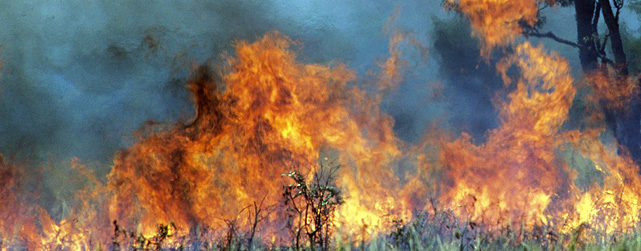Firefighters are urging residents to remain vigilant as hot, dry and windy weather brings increased fire danger to Ipswich and southern Queensland.
There is a fire ban is in place for Ipswich and surrounding council areas until midnight, Sunday, 8 September.
Conditions are perfect for bushfires to ignite and spread quickly with the above average temperatures the region is experiencing at the moment.
It coincides with a particularly dry spell for Ipswich which recorded 6mm of rain in August, well below the city’s historical August rainfall average of 28.3mm.
A north-westerly trough is dragging warm air from the state’s interior across the south-east, but meteorologists hope cooler weather to come though on Saturday and Sunday.
Queensland Fire and Emergency Services (QFES) Acting Commissioner Mike Wassing said these conditions will be challenging for firefighters.
“Bushfires which start will be fast-moving and hard to contain,” Mr Wassing said.
“This is the first time this bushfire season where we will experience conditions like this and our highly trained and skilled firefighters are ready to respond if required.
“We also have several water-bombing aircraft on standby, ready to respond from Toowoomba, Boonah, Bundaberg and Giru.”
Fifty firefighters have been brought in from interstate to the south-east where regions have been declared to have extreme fire danger ratings.
Mr Wassing urged residents to be alert and avoid starting any fires.
“We ask residents to avoid using outdoor machinery near vegetation during these heightened fire conditions, as one stray spark is all it takes to start a bushfire,” he said.
“We are talking about any sort of machinery used in grassed or vegetated areas, such as slashers, lawn mowers, tractors and brush-cutters.
“Similarly, we ask residents to avoid using tools such as grinders or welders during this time.”
The advice is to report any fires immediately to triple zero (000) and to monitor bushfire warnings that have been issued for their area.
For bushfire warnings, click here.


Images courtesy: QFES
What you can do to be prepared
Around the home
- Clear leaves, twigs, bark and other debris from the roof and gutters.
- Purchase and test the effectiveness of gutter plugs.
- Enclose open areas under decks and floors.
- Install fine steel wire mesh screens on all windows, doors, vents and weep holes.
- Point LPG cylinder relief valves away from the house.
- Conduct maintenance checks on pumps, generators and water systems.
- Seal all gaps in external roof and wall cladding.
- Relocate flammable items away from your home, including woodpiles, paper, boxes, crates, hanging baskets and garden furniture.
Make it easy for emergency services
- Display a prominent house or lot number, in case it is required in an emergency.
- Ensure there is adequate access to your property for fire trucks – four metres wide by four metres high, with a turn-around area.
In the garden
- Reduce vegetation loads along the access path.
- Mow your grass regularly.
- Remove excess ground fuels and combustible material (long dry grass, dead leaves and branches).
- Trim low-lying branches two metres from the ground surrounding your home.
Take care of yourself
- Check that you have sufficient personal protective clothing and equipment.
- Check the first aid kit is fully stocked.
- Make sure you have appropriate insurance for your home and vehicles.
- Have a bushfire survival plan.



